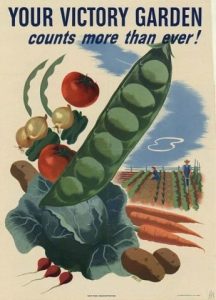I always thought the term Victory Garden sounded so positive. I asked my mother, who turns 90 this year, if she remembers having a Victory Garden. Oh yes…her Irish immigrant father grew carrots and potatoes in the garden in their San Francisco back yard as well as in the empty lot behind them.
The Liberty Garden of WWI was renamed The Victory Garden for WWII. The purpose was to establish private and community gardens to grow fruits, vegetable, and herbs for local consumption and export for troops. While providing local food, the gardens also conserved transportation and labor resources needed for troops and supplies.
When Eleanor Roosevelt planted a Victory Garden on part of the White House lawn, what had been a recreational pastime became a patriotic duty and morale booster. The public did their part ‘on the home front’ by reducing the demand on food and labor supplies by growing food locally. Approximately 20 million Americans were able to produce 40% of the produce consumed nationally.
History reminds us to learn from the past. Let’s recreate our own modern day Victory Gardens that can help us save some money, eat healthier foods, and connect better with our environment. We can give ourselves and our children something positive during these down times by planting and harvesting some of our own foods. Create memories of happy, shared times in the garden with family and friends. Start your own vegetable patch. Join or start a community garden. Get involved with a school garden.
You don’t have to tackle a back yard vegetable garden; you can start a small container garden. Herbs and spices such as parsley, basil, and green onions as well as tomatoes and strawberries can all be grown on your porch in a ceramic or redwood planter. You’ll know it’s fresh.
Master Gardeners are volunteers who want you to succeed (be Victorious) with your gardening endeavors. We are available for phone and e-mail questions in Tuolumne County at 209.533.5912 or email mgtuolumne@ucdavis.edu.
Pat Gogas is a new graduate from the University of California Cooperative Extension Tuolumne County Master Gardener training program. As a volunteer garden educator, she will donate 50 hours of volunteer time this year.



